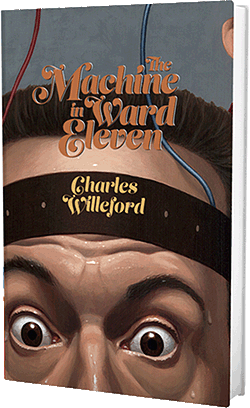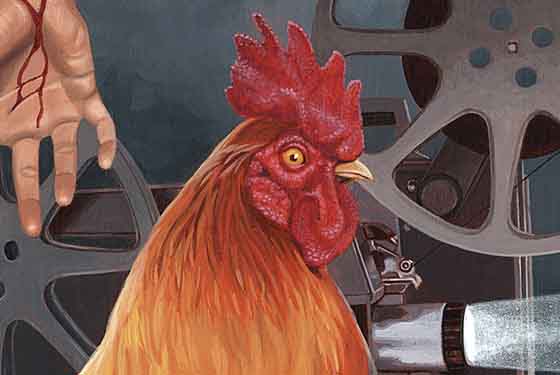



synopsis
“A man’s mind is a tricky thing, Blake.” So says Dr. Adams to hotshot director, Jake Blake. But those aren’t the words of caution during a routine check-up. They’re spoken as a grim reminder from within the walls of an asylum. And spoken to a man whose memory has all but vanished just like his best days that are far behind him.
Thus begins the madness, cynicism, and disillusionment that runs rampant throughout Charles Willeford’s pocket pulp classic, The Machine in Ward Eleven. Fashioned from six jarring but candid stories, this collection spells out the matter-of-fact brutality of a society that’s too coolly calculated in its deposal of the individual and the human spirit. Sadly, it’s a society not far removed from our own.
Look no further than “A Letter to A.A. (Almost Anybody)” in which a man struggling with alcoholism finally finds the strength to hop back onto the wagon. As if recovery is tough enough, it’s made even worse when someone else is ready to pounce and pilfer at sobriety’s expense.
“Jake’s Journal” features a despondent airman who’s restationed to a desolate island after partaking in unbecoming activities. But when his ticket to ride off those barren shores arrives, it’s the kind of freedom that will leave his prospects a little too “up in the air.”
Other stories such as “Selected Incidents,” “Just Like on Television—” and “The Machine in Ward 11,” serve as an indictment of the Hollywood scene for its unforgiving attitude toward its own kind and its harmful influence on the public at large. You’ll find no shortage of “crazies” and conflated egos, but the most troubling aspect is ruing the loss of talent over humanity, in which all is lost, and madness is elevated to normalcy.
These are certainly stories of their time, affected by nascent political and cultural views that may have already met an early grave, but great stories survive for a reason. They’ve traveled through time with the same fierce drive of distrust and dispute that makes them as raw now as when they were first published sixty years ago. If you aren’t already a believer, you may turn into one upon reading Willeford’s honest assessment of our world. For it’s a grim reminder that if we don’t treat the bleak diagnosis, our best days, like with Blake, may already be far behind us.
edition information
pricing
SOLD OUT